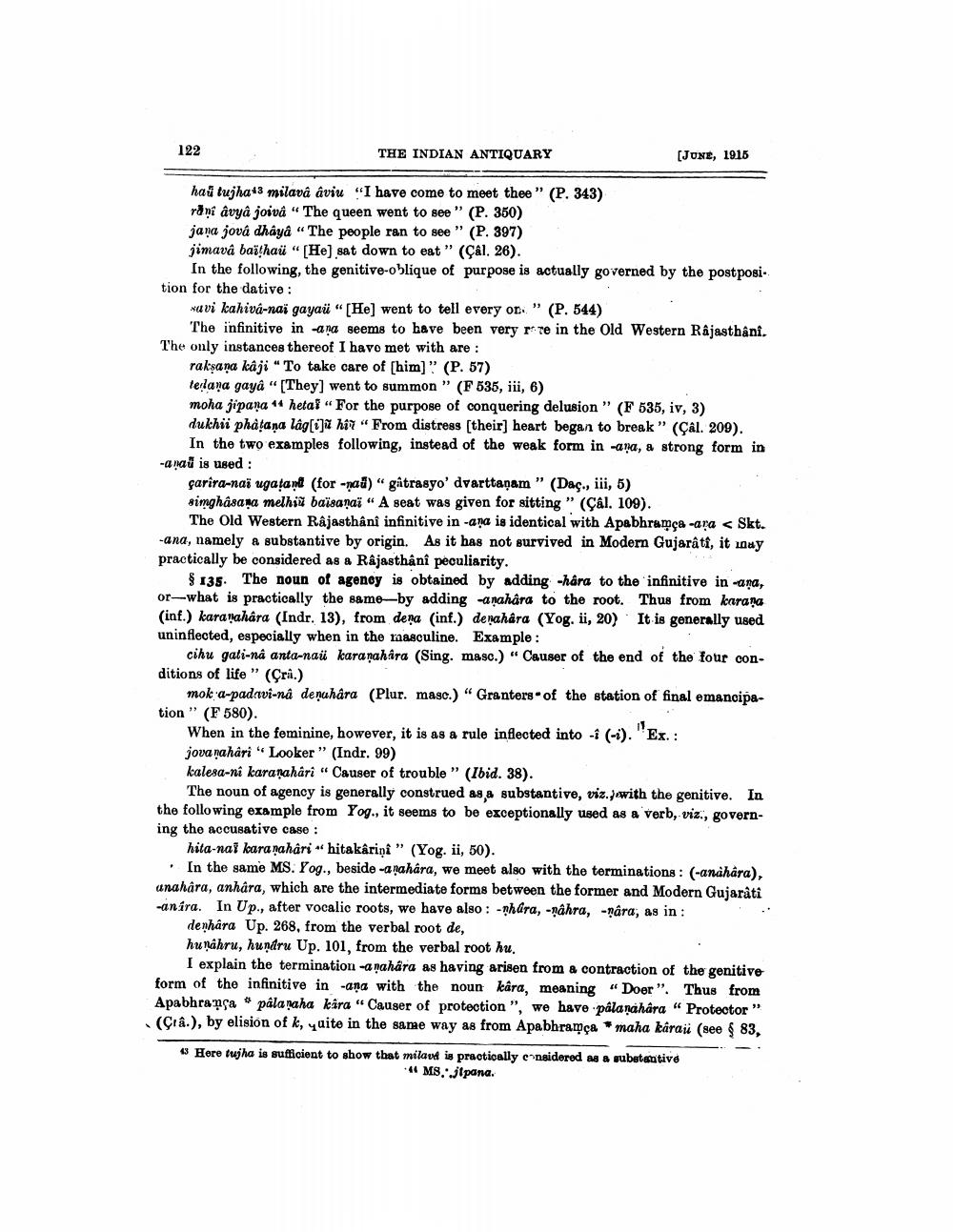________________
122
THE INDIAN ANTIQUARY
[JUNE, 1915
hai tujha 3 milavâ âviu "I have come to meet thee" (P. 343). rani âvyâ joiva "The queen went to see" (P. 350) jana jová dhâyâ "The people ran to see " (P. 397)
jimavâ baithai "[He] sat down to eat" (Çâl. 26).
In the following, the genitive-oblique of purpose is actually governed by the postposi tion for the dative:
savi kahivá-nai gayaü "[He] went to tell every on." (P. 544)
The infinitive in -ana seems to have been very rare in the Old Western Rajasthânî. The only instances thereof I have met with are:
rakṣana kâji "To take care of [him]" (P. 57)
33
telana gaya "[They] went to summon (F 535, iii, 6)
moha jipana hetal " For the purpose of conquering delusion" (F 535, iv, 3) dukhii phatana lag[i] hir" From distress [their] heart began to break" (Çâl. 209).
In the two examples following, instead of the weak form in -ana, a strong form in -anal is used:
çarira-naï ugatan (for -na)" gâtrasyo' dvarttaṇam" (Daç., iii, 5)
simghasara melhi baisaṇaï "A seat was given for sitting" (Çâl. 109).
The Old Western Râjasthânî infinitive in -ana is identical with Apabhramça -ara < Skt. -ana, namely a substantive by origin. As it has not survived in Modern Gujarâti, it may practically be considered as a Râjasthânî peculiarity.
§ 135. The noun of agency is obtained by adding -håra to the infinitive in -ana, or what is practically the same-by adding -anahâra to the root. Thus from karana (inf.) karanahara (Indr. 13), from dena (inf.) denahara (Yog. ii, 20) It is generally used uninflected, especially when in the masculine. Example:
cihu gali-nâ anta-nau karanahara (Sing. masc.) "Causer of the end of the four conditions of life" (Çrâ.)
mok a-padavi-nå denuhâra (Plur. masc.) "Granters of the station of final emancipation" (F 580). "Ex.:
When in the feminine, however, it is as a rule inflected into - (-i).
jovanahari Looker" (Indr. 99)
kalesa-ni karanahâri "Causer of trouble" (Ibid. 38).
The noun of agency is generally construed as a substantive, viz.) with the genitive. In the following example from Yog., it seems to be exceptionally used as a verb, viz., governing the accusative case :
hita-nal karanahâri hitakâriņi" (Yog. ii, 50).
In the same MS. Yog., beside -anahára, we meet also with the terminations: (-anahara), anahâra, anhâra, which are the intermediate forms between the former and Modern Gujarati -anira. In Up., after vocalic roots, we have also: -nhara, -nâhra, -nâra, as in:
denhâra Up. 268, from the verbal root de,
hunâhru, hundru Up. 101, from the verbal root hu.
I explain the termination -anahara as having arisen from a contraction of the genitive form of the infinitive in ana with the noun kâra, meaning "Doer". Thus from Apabhrança" pâlanaha kâra "Causer of protection ", we have pâlanahara "Protector" (Crâ.), by elision of k, quite in the same way as from Apabhramça maha karai (see § 83,
43 Here tujha is sufficient to show that milavt is practically considered as a substantive 44 MS..jipana.




